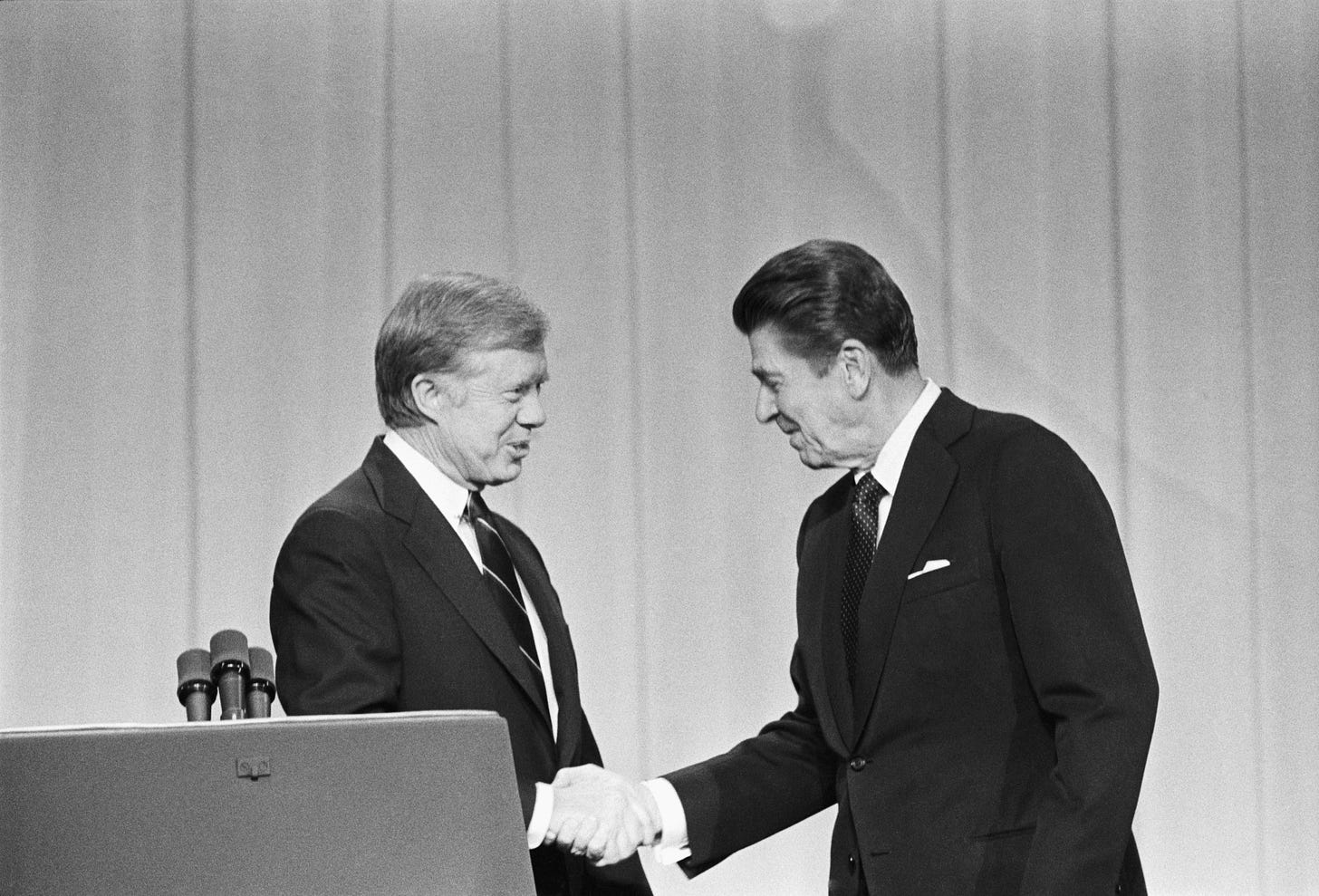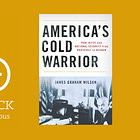Happy Birthday To... The First Reaganite?
Jimmy Carter, who turns 100 today, started many of the policies that came to be associated with the Reagan Revolution.
Today we’re delighted to publish an article by the historian Richard Aldous to mark Jimmy Carter’s 100th birthday. Richard presents the Bookstack podcast, carried forward from American Purpose and now hosted at Persuasion. The podcast features bi-weekly interviews with authors about the most important new book releases, covering politics, history, culture, the world, and plenty of other things you didn’t know you were interested in! To add Bookstack to your podcast feed, click the button below:
Former president Jimmy Carter turns 100 today, defying both science and actuarial odds after more than a year in hospice care. His post-presidency is widely regarded as one of the most successful in the modern era, setting a model for a meaningful life after the Oval Office. In contrast, his presidency is still considered, at best, middling. Given that most historians who rank presidents tend to lean left/liberal, the public likely views his term even less favorably. Yet, while Carter may not have been a Lincoln, neither was he a Ford. Notably, his role in laying the foundations for the Reagan Revolution that followed is often overlooked.
Part of Carter’s reputational struggle stems from being a one-term president and an election loser. His exit from the White House in January 1981 was as ignominious as it gets. Physically exhausted, humiliated by the Iranian hostage crisis, and presiding over what he himself described as a national malaise “that strikes at the very heart and soul and spirit of our national will,” Carter left office not just defeated, but broken. The contrast with his successor, Ronald Reagan—the Great Communicator with a film star’s aura, sunny Californian demeanor, and clear messaging—could not have been starker.
Reagan, rightly, would receive credit for the sense of national renewal that followed in the 1980s, culminating in Cold War victory abroad and “morning in America” at home. This was the start of the “Great Moderation” in politics and economics. But it was Carter who laid the groundwork for that success. As much as it may irritate both liberals on the left and Reagan’s disciples on the right, Carter was, in many important ways, the first Reaganite.
At home, faced with hyperinflation and the threat of currency collapse, Carter adopted policies to enhance the productive side of the economy. He introduced broad tax cuts, reducing both personal and business rates, and nearly halved the capital gains tax. He was even more aggressive on deregulation, making it a central plank of his presidency. The airline industry, for example, underwent a revolution under Carter, fostering new carriers and cheaper fares. The clampdown on price-fixing and the dismantling of route controls extended its impact beyond the United States—as anyone flying Ryanair in Europe can attest.
Most importantly, in 1979, Carter nominated an inflation hawk, New York Fed President Paul Volcker, as chairman of the Federal Reserve, with a specific mandate to attack inflation. He followed this up in 1980 with an Economic Report that identified inflation as the number one economic priority and laid down a plan to defeat it with fiscal and monetary restraint and increased productivity.
These were the first steps in a new “supply-side” approach—what Senator Lloyd Bentsen, a Texas Democrat and chair of the Joint Economic Committee, called “a new era of economic thinking.” The Reagan administration would carry it forward with vigor, but as Herbert Stein, chairman of the Council of Economic Advisers under Presidents Nixon and Ford, noted, “the decisive step toward the kind of policy practiced [under] Reagan had been taken earlier, in the fall of 1979.” When inflation was defeated in the 1980s, few remembered Carter’s contribution, but Volcker did. “I always give him a lot of credit in my mind,” he said.
Even in the process of rearmament and adopting a more offensive posture toward the Soviet Union—a policy associated with Reagan—a shift had already begun under Carter. In 1979, he committed the United States to deploying 464 cruise missiles and 108 Pershing II’s in Europe, in direct response to Soviet SS-20s. He also agreed to supply Britain with a new generation of Trident submarine-launched ballistic missiles, replacing its aging Polaris system. In 1980, after the Soviet invasion of Afghanistan, he proclaimed what became known as the Carter Doctrine, giving unprecedented military guarantees to allies in the Middle East.
Defense spending was also substantially increased. He heaped economic pressure on the Soviets with an embargo on selling them American grain. Most significantly, he secretly signed a new Presidential Directive (PD-59) that was predicated on the United States fighting a limited nuclear war and directly targeted the Soviet Union’s economy and military assets—policies Reagan would soon embrace and amplify.
Of course, there were important differences between the two men—in both substance and style. Carter, the president who collapsed in front of the world’s media while jogging, certainly did not project physical strength like Reagan, the horseback-riding, brush-clearing outdoorsman. Carter’s obsession with detail often blurred his strategic vision, while Reagan offered clarity on big issues. (Carter’s attention to minutiae notoriously extended to the White House tennis court schedule.) And though Reagan was a loner at heart, he radiated affability and confidence, while Carter often appeared thin-skinned and humorless. Tip O’Neill, the gregarious Democratic Speaker of the House, famously loathed him. Anecdotes abound of ex-world leaders like Germany’s Helmut Schmidt and Britain’s James Callaghan failing to invite Carter to their gatherings out of office, finding him too dull to endure.
Equally, Reagan surpassed Carter on substance. His tax cuts, tax reforms, and deregulation were more radical, and the inflation that plagued the 1970s was brought under control on his watch. In the Cold War, Reagan provided unmatched strategic lucidity (“We win, they lose”) and backed it up with dramatically increased defense spending, tightening the screws on the Soviets both militarily and economically. By the decade’s end, the Cold War was won—an unimaginable prospect when Carter left office in 1981.
Still, while Reagan took things to the next level, the initial strategic shift toward supply-side economics and, to some degree, a tougher stance in the Cold War had already occurred during the Carter years. Whatever the differences in style and policy emphasis, there’s a clear sense of continuity from the thirty-ninth to the fortieth president that transcends the chaos and humiliation of Carter’s defeat in November 1980. If Reagan hit the winning shot, Carter had at least teed it up.
Neither party seems particularly interested in embracing Carter’s—or even Reagan’s—legacy today. Certainly, many on the left would hardly see being called the first Reaganite as a compliment. But as Carter turns 100, he might smile, or perhaps grimace, at the current election landscape. An enfeebled incumbent grappling with high inflation and a spiraling Middle East crisis, a chuckling Californian nominee promising a more joyful republic against an opponent’s talk of national malaise, the presence of a screen-star candidate, and even a maverick Kennedy earlier in the mix—the menu may be different, but the ingredients feel oddly familiar.
Carter, though, will surely be hoping for a different outcome than in 1980, not least because—those actuarial odds again—the next president may well be the one to lead the nation in mourning his passing. Yet, when he celebrates his hundredth birthday, Carter might take some pleasure in the fact that his political courage in sticking to his policy pivot, despite the cost to his own electoral ambitions, is slowly being recognized as an important part of American success in the Eighties. As Carter noted in his diary on the campaign trail in 1980, about supporting Volcker—“This will hurt us politically, but I think it’s the right thing to do.” In the end, that surely is the yardstick by which we judge any president.
Richard Aldous is Eugene Meyer Distinguished Professor of History at Bard College and host of Persuasion’s Bookstack podcast. His most recent books are Schlesinger and The Dillon Era.
Follow Persuasion on X, LinkedIn, and YouTube to keep up with our latest articles, podcasts, and events, as well as updates from excellent writers across our network.
And, to receive pieces like this in your inbox and support our work, subscribe below:





Learned a lot from this!
Great article!